William Graham Sumner, from "On Empire and the Philippines" (1898)
William Graham Sumner, from "On Empire and the Philippines" (1898)
William Graham Sumner, from "On Empire and the Philippines" (1898)
Create successful ePaper yourself
Turn your PDF publications into a flip-book with our unique Google optimized e-Paper software.
<strong>William</strong> <strong>Graham</strong> <strong>Sumner</strong>, <strong>from</strong> "<strong>On</strong> <strong>Empire</strong> <strong>and</strong> <strong>the</strong> Philippines" (<strong>1898</strong>)<br />
"<strong>On</strong> <strong>Empire</strong> <strong>and</strong> <strong>the</strong> Philippines," <strong>the</strong> essay <strong>from</strong> which this extract comes, was written in<br />
<strong>1898</strong> <strong>and</strong> was published in <strong>William</strong> <strong>Graham</strong> <strong>Sumner</strong>'s War <strong>and</strong> O<strong>the</strong>r Essays. After<br />
entering Yale as a student in 1859, <strong>Sumner</strong> studied abroad after graduation, <strong>and</strong><br />
returned to teach at his alma mater until his death in 1910. Known as a social Darwinist,<br />
<strong>Sumner</strong> was also an ardent anti-imperialist. He clearly states his anti-imperialist stance<br />
in this selection.<br />
There is not a civilized nation that does not talk about its civilizing mission just as<br />
gr<strong>and</strong>ly as we do. The English, who really have more to boast of it in this respect than<br />
anybody else, talk least about it, but <strong>the</strong> Phariseeism 1 with which <strong>the</strong>y correct <strong>and</strong> instruct<br />
o<strong>the</strong>r people has made <strong>the</strong>m hated all over <strong>the</strong> globe. The French believe <strong>the</strong>mselves <strong>the</strong><br />
guardians of <strong>the</strong> highest <strong>and</strong> purest culture, <strong>and</strong> that <strong>the</strong> eyes of all mankind are fixed on<br />
Paris, whence <strong>the</strong>y expect oracles of thought <strong>and</strong> tasted. The Germans regard <strong>the</strong>mselves<br />
as charged with a mission, especially to us Americans, to save us <strong>from</strong> egoism <strong>and</strong><br />
materialism. The Russians, in <strong>the</strong>ir books <strong>and</strong> newspapers, talk about <strong>the</strong> civilizing<br />
mission of Russian in language that might be translated <strong>from</strong> some of <strong>the</strong> finest<br />
paragraphs of our imperialistic newspapers.<br />
The first principle of Mohammedanism is that we Christians are dogs <strong>and</strong> infidels, fit<br />
only to be enslaved or butchered by Moslems. It is a corollary that wherever<br />
Mohammedanism extends it carries, in <strong>the</strong> belief of its votaries, 2 <strong>the</strong> highest blessings,<br />
<strong>and</strong> that <strong>the</strong> whole human race would be enormously elevated if Mohammedanism should<br />
supplant Christianity everywhere.<br />
To come, last, to Spain, <strong>the</strong> Spaniards have, for centuries, considered <strong>the</strong>mselves <strong>the</strong> most<br />
zealous <strong>and</strong> self-sacrificing Christians, especially charged by <strong>the</strong> Almighty, on this<br />
account, to spread <strong>the</strong> true religion <strong>and</strong> civilization over <strong>the</strong> globe. They think <strong>the</strong>mselves<br />
free <strong>and</strong> noble, leaders in refinement <strong>and</strong> <strong>the</strong> sentiments of personal honor, <strong>and</strong> <strong>the</strong>y<br />
despise us as sordid money-grabbers <strong>and</strong> heretics. I could bring you passages <strong>from</strong><br />
peninsular authors of <strong>the</strong> first rank about <strong>the</strong> gr<strong>and</strong> role of Spain <strong>and</strong> Portugal in<br />
spreading freedom <strong>and</strong> truth.<br />
Now each nation laughs at all <strong>the</strong> o<strong>the</strong>rs when it observes <strong>the</strong>se manifestations of national<br />
vanity. You may rely upon it that <strong>the</strong>y are all ridiculous by virtue of <strong>the</strong>se pretensions,<br />
including ourselves. The point is that each of <strong>the</strong>m repudiated <strong>the</strong> st<strong>and</strong>ards of <strong>the</strong> o<strong>the</strong>rs,<br />
<strong>and</strong> <strong>the</strong> outlying nations, which are to be civilized, hate all <strong>the</strong> st<strong>and</strong>ards of civilized men.<br />
We assume that what we like <strong>and</strong> practice, <strong>and</strong> what we think better, must come as a<br />
welcome blessing to Spanish-American <strong>and</strong> Filipinos. This is grossly <strong>and</strong> obviously<br />
untrue. They hate our ways. They are hostile to our ideas. Our religion, language,<br />
institutions, <strong>and</strong> manners offend <strong>the</strong>m. They like <strong>the</strong>ir own ways, <strong>and</strong> if we appear<br />
amongst <strong>the</strong>m as rulers, <strong>the</strong>re will be social discord in all <strong>the</strong> great departments of social<br />
1 Hypocritical observance of <strong>the</strong> letter of religious or moral law without regard for <strong>the</strong> spirit; sanctimoniousness.<br />
2 A devout adherent of a religion
interest. The most important thing which we shall inherit <strong>from</strong> <strong>the</strong> Spaniards will be <strong>the</strong><br />
task of suppressing rebellions.<br />
If <strong>the</strong> United States takes out of <strong>the</strong> h<strong>and</strong>s of Spain her mission, on <strong>the</strong> ground that Spain<br />
is not executing it well, <strong>and</strong> if this nation in its turn attempts to be schoolmistress to<br />
o<strong>the</strong>rs, it will shrivel up into <strong>the</strong> same vanity <strong>and</strong> self-conceit of which Spain now<br />
presents an example. To read our current literature one would think that we were already<br />
well on <strong>the</strong> way to it.<br />
Now, <strong>the</strong> great reason why all <strong>the</strong>se enterprises which begin by saying to somebody else,<br />
"We know what is good for you better than you know yourself <strong>and</strong> we are going to make<br />
you do it," are false <strong>and</strong> wrong is that <strong>the</strong>y violate liberty; or, to turn <strong>the</strong> same statement<br />
into o<strong>the</strong>r words, <strong>the</strong> reason why liberty, of which we Americans talk so much, is a good<br />
thing is that it means leaving people to live out <strong>the</strong>ir own lives in <strong>the</strong>ir own way, while<br />
we do <strong>the</strong> same.<br />
If we believe in liberty, as an American principle, why do we not st<strong>and</strong> by it? Why are we<br />
going to throw it away to enter upon a Spanish policy of dominion <strong>and</strong> regulation?<br />
Document Analysis<br />
According to this address, why should <strong>the</strong> United States refrain <strong>from</strong> expansion?<br />
What were <strong>the</strong> similarities between pro- <strong>and</strong> anti-expansionists? Do <strong>the</strong>y refer to some<br />
of <strong>the</strong> same principles?<br />
What dangers would expansion bring to <strong>the</strong> United States? How would it harm our<br />
annexed territories?


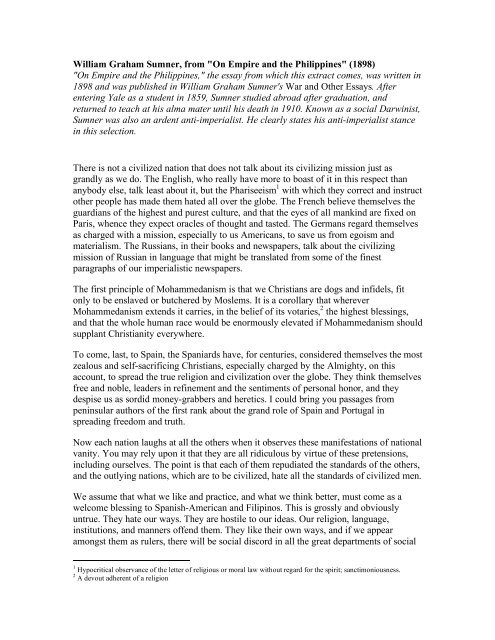

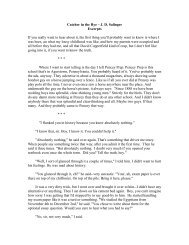
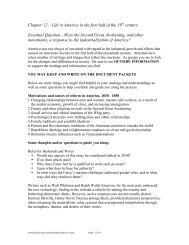


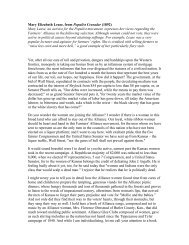
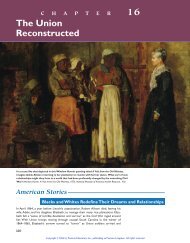
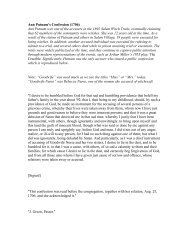
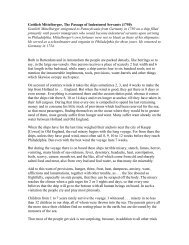



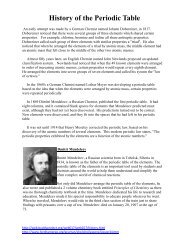

![âArt [and History] by Lightning Flashâ: The Birth of a Nation and Black ...](https://img.yumpu.com/45585047/1/190x245/aart-and-history-by-lightning-flasha-the-birth-of-a-nation-and-black-.jpg?quality=85)